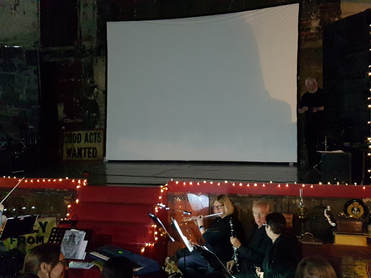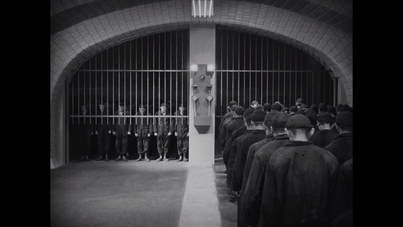|
Metropolis was a film I’d always wanted to see, but being honest spending two hours watching silent German expressionism at home when there’s still that daunting pile of to complete PlayStation games was never really a viable option. Fortunately there was to be a screening accompanied by a live orchestra, Gladstone’s Bag, at a venue that was already 70 years old before this 1920s classic even premiered, Glasgow’s Britannia Panopticon. The setting was ideal, the world’s oldest music hall for one of the world’s oldest sci-fi features. The in restoration building with rotten wooden balcony and decrepit (though stable) ceiling a fascinating memorial to the past showing a film of shining ‘modern’ skyscrapers that was dreaming of the future. The live music – and let’s not forget the live foley artists – helped so much to engage with what was being projected. It was the 1984 Giorgio Moroder version on show, but with music drawn from more original scores. This version did leave the feeling like there were large chunks missing, casually explained away in laconic title cards, and left us guessing as to what were good 1920s special effects and what were bad 1980s effects, but the brisk 83 minute runtime was welcome. Metropolis is at its strongest when it goes grand. Armies of synchronised, shuffling workers; elaborate, arcane machinery and huge overbearing sets are still mightily impressive today. The variety of camera techniques, POVs, tracking and light flares which to my eye seem cutting edge for the period – though without a working knowledge of 1920s movie standards I’m likely doing their contemporaries a disservice – coupled with close ups of the cast’s ghostly white faces and exaggerated features leave no doubt as to why the film has become so iconic.
The smaller moments, to be expected, have aged the poorest. There were points, particularly Brigette Helm’s robotic winking which made the audience burst out laughing. I’m inclined to give her a pass seeing as she pretty much was the first robot, and at least the crowd weren’t throwing piss at the screen like the Panopticon’s patrons of a century ago. Though dialogue subtext was still a glint in the screenwriter’s eye, it serves the principal need of relaying exposition and character dynamics. Some of these relationships are confusing; why does Rotwang help Fredersen when he beat him to Hel’s affections? How useless is The Thin Man at keeping tabs on Freder? Is Freder’s full name Freder Fredersen? I won’t be winning any prizes for telling you this film is about social justice. One of the first title cards saying how the workers live underground screams that as loud as the horn that signals their shift change. But its resolution is one not often seen in cinema, everyone pretty much agreeing to go on as was, but being a little nicer to each other. All it needed was the middle classes to jump in and be “the heart” between “the head” overlords and “the hand” working classes. At least they all teamed together to stop the machine – which the big corporate bastard had for some reason tried to use to exploit the working classes, even though his control over them already seemed pretty cast iron, before losing control of it within a scene. Also you could pretty much see half the workers in the shift changes marching straight into the Nazi party over the next decade. While it’s not going to be cracking the top film list, Metropolis is one anyone with a passing interest in cinema, sci-fi, or who that robotic chick they keeping seeing in popular culture is should give a watch. However the setting of one of the proclaimed world’s oldest cinemas and a live orchestra definitely goes up as one of the top film going experiences.
0 Comments
Leave a Reply. |
Archives
June 2020
Categories |


 RSS Feed
RSS Feed
